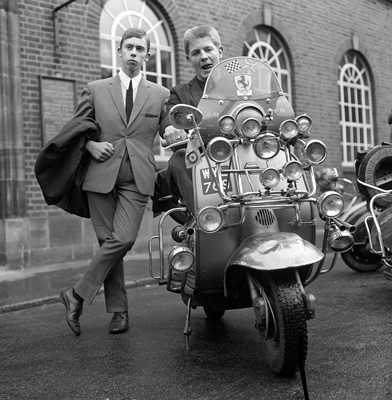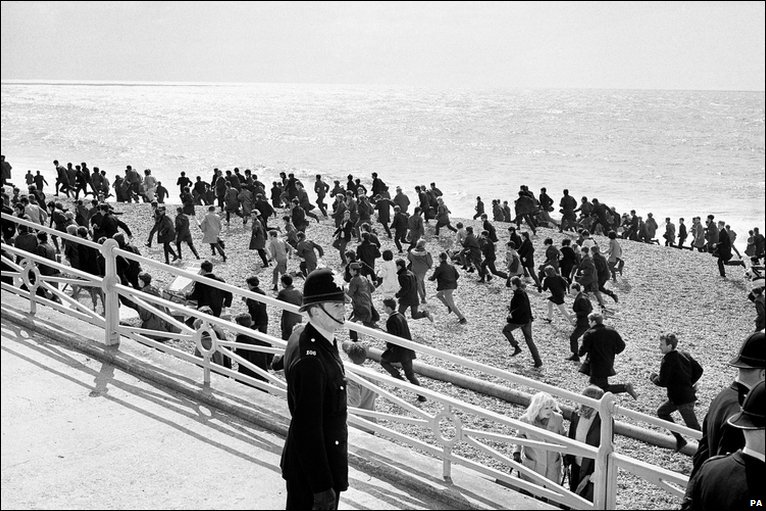Youth culture in Britain in the late 1950s and early 1960s created a murky breeding pool in which many restless and dissatisfied teens floundered for meaning and purpose beyond the comfortably drab lifestyles of their working-class parents. The iconic “Mods” were one such rebellious stream, and the impact of this youth subculture can be seen in the music of British rock artists rising from the waters. In listening to David Bowie’s early track “The London Boys,” I thought wise to revisit the history of the Mods, and perhaps compare Bowie’s timely commentary to the album Quadrophenia, released by The Who several years later.
Developing in London in the late 1950s in Soho, the Mods, or “Modernists,” seem to have grown out of an affinity for modern jazz music and fashion, and a desire to differentiate themselves from other, perceived lesser, youth groups at the time. Unlike the Rockers, who took their cues from American culture, the Mods looked to Europe for inspiration, donning a signature French crewcut and riding through town on their Italian motor scooters.
But this budding subculture exceeded a fad for dress or music, developing into what may be described as a street gang of passionately disillusioned youth. The frenzy eventually climaxed in a violent confrontation of the Mods and the Rockers in May of 1964 at beach towns such as Brighton and Margate. Though the clash was wildly sensationalized by the media, the event was nonetheless destructive.
“The London Boys” is Bowie’s melancholy reaction to the plight of this youth cult, portraying his obvious despair for the lack of purpose that plagued the Mods. Lines like, “Now you’ve met the London boys/ Things seem good again, someone cares about you,” become ironic and thin backed by the uncomfortable and ever escalating keys of the music. The story goes on to incite Bowie’s dissatisfaction with the feigned independence, pill-popping, and materialism of the Mod teens in snarky despondency as the song crescendos through a range on slightly unsettling pitches.
The song itself is unconventional, with the oboe’s opening and the light organ accompaniment, it seems to fall somewhere between genres, especially at the time of its release. The mounting key changes create a theatrical mood that opens new doors of inspiration for other British artists, evident in songs like “I’ve Had Enough” off of The Who’s Quadrophenia. Though “I’ve Had Enough” incorporates a more traditional rock instrumentation, it mimics Bowie’s dramatic escalation and key changes.
Bowie’s “The London Boys” comes just two years after the infamous seaside riots of 1964, suggesting that the young David, who was then just nineteen years old, possessed a more mature insight than his peers, not content with the aimless rebellion. Bowie’s lyrics remain in a highly ambiguous second person throughout the song, referring to a genderless, nameless “you,” suggesting that his dissatisfaction could be applied to any teen who searched, but would not find purpose in Mod culture. In contrast, The Who’s “I’ve Had Enough,” was not released until 1973, after the height of this youth cult had tided, and the failure of this movement was evident to most. The track begins with a verse in the second person, referring to the expectations of the supposed Mod, but in the chorus assumes a first person narrative, delineating the speaker’s malcontent with the empty nature of Mod culture.
I think that this comparison of Bowie’s “The London Boys” and The Who’s “I’ve Had Enough” indicates David Bowie’s progressive style and influential abilities. Even at such a young age, Bowie was challenging musical structures and lyrical content, and voicing his critical views of the world around him.


Very interesting comparison of the two songs. I hadn’t thought about the rising chords the verses of “I’ve Had Enough” and the second-person address as being similar to “The London Boys” but that is a spot-on comparison.
LikeLike
Grace, this is a very well written essay. You have a real talent for this form of writing. I liked very much your background discussion of the Mods and Rockers, in particular your reference to their geo-cultural orientations. Also, very nice touch with hot links to other articles in the text. Well done!
LikeLike